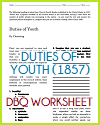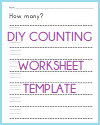| Share the learning joy! |
Homeschool Guide |
Guide for Homeschooling Parents |
Making the decision to educate your children
yourself is easily described as one of the biggest decisions you
will ever make. Actual educational materials, forms, etc., are
located elsewhere on this site (links at the bottom). There are
numerous groups with websites offering support and legal advice. This section is designed to give teaching tips. |
What is the curriculum? The curriculum is the entire group of
subjects and materials which educators are expected to teach in
their classrooms. Curricula vary by state. A state may have
Science, Language Arts, Mathematics, Music, Physical Education,
and Social Studies in a seventh-grade curriculum. |
The curriculum
will further specify what topics, themes, objectives, etc., must
be covered within each subject. For seventh-grade Music, the state curriculum might say that students must learn about the major composers and the various genres of music, as well as learn to play the recorder. |
Click here for curriculum guidelines by state. |
Currently, there is a nationwide effort
to utilize the Common Core State Standards (CCSS) throughout the
United States. And not surprisingly, there are plenty of
people arguing for and against them. |
What am I expected to teach? In a nutshell, the CCSS are designed to
incorporate nonfiction and "facts" in the teaching of
reading and math. Scientific research has shown that while
reading skills are important, they do not translate into
true literacy (and learning power) later in life. What's
needed is background information to enhance reading
comprehension. For example, most people have the reading skills to read an advanced physics book. We can read along, pronouncing most of the words aloud or in our heads. We see terms like "quasar" and if we don't know what the word means, we try to figure it out in context, or look it up in a dictionary or encyclopedia. But does this mean that we truly comprehend the text? Could we put it into our own words? Could we turn around and explain what we've just read to someone else? For most of us, the answer is no. We are reading, but we are not comprehending what we are reading. Despite what you may have read in the media or from a publisher peddling textbooks, at their core, the CCSS are the standards established by the Core Knowledge Foundation. This agency's goal is essentially to equip each student, upon graduation from high school, with the cultural literacy needed to navigate in the modern United States, either in a career or at a university. This cultural literacy is the background knowledge and corresponding reading skills needed to understand news articles, etc., and to make informed decisions. In classrooms, this means that teachers are no longer reading 90% fiction. Teachers are instead now making certain that at least 50% of the texts read in the classroom are nonfiction, covering the history of the world and United States, etc. Will every high school graduate be expected to understand an advanced physics book? No, that was just an example to illustrate how most of us lack reading comprehension skills in one way or another. But students will be able to read an article on filibustering in Congress in the New York Times, for example, with an understanding of the three branches of the federal government, legislative procedures, etc. |
How can I teach the curriculum? You can acquire a copy of your area's
curriculum by contacting your local district. Additionally, most state education departments have their curricular standards available online (try searching for "*MY STATE* EDUCATION DEPARTMENT STANDARDS"). State guidelines, however, can be confusing, even for trained teachers. A better way to get a grasp of your local curriculum is to look at the textbooks your district is using. Even if you choose not to rely on these textbooks for your own
teaching, they can tell you what material you are expected to
cover. Publishers create textbooks around curricular standards, which partly explains why it seems like every district uses a different textbook. |
| Does it really matter that I stick to the curriculum? |
| Implementing the curriculum into your homeschool will help to prepare your child for standardized testing. If you plan to enroll your child in a traditional school at some point, you will want to make certain that your child is on par with other students. NOTE: A kind homeschooler in West Virginia wrote to let us know that in her state, as well as in Virginia, homeschoolers are not required to follow the state curriculum. We know this to be true of many states. As our friend pointed out, the fact that parents do not have to follow a standard curriculum is a major attraction of homeschooling. |
We are
providing information on curricula for everyone simply so that
(a) parents can better understand what the curriculum means, and
(b) those parents who plan to have their children take state
proficiency tests or enroll in a school at high school age will
know what their kids are expected to know. |
We sincerely thank
our friend for pointing out the "no curriculum advantage" of
homeschooling, because we assume that she was not alone in
noticing our failure to clarify this point. If anyone has any
further comments or suggestions, please do not hesitate to send
us an email. |
| Why is my local curriculum so different from what my friend is teaching somewhere else? |
| Different curricula focus on different subjects at different times. This is known as the "scope and sequence" of a curriculum. "Scope" refers to how in-depth the study of a subject goes. For instance, do students study the many historical territorial disputes over Poland leading up to World War II, or do students simply learn that Hitler and Stalin agreed to divide Poland? |
| As a homeschooling parent, you are free to add more depth to the topics you teach. The major rule-of-thumb is to teach only as much as is appropriate for the child. Most fourth-graders can understand that the president leads the country, but cannot understand the political machinations of government. |
| "Sequence" refers to when subjects are taught. Many states opt to divide World History over two years, with students learning the history of the world to 1500 in seventh grade, and the history of the world since 1500 in tenth grade. Other states teach only American History in the seventh and eighth grades, reserving World History for high school. |
| If you plan to homeschool your child through eighth grade and then send your child to a traditional school, knowing your local curricular sequence is very important to avoid both lapses and repetition. |
| What are the advantages of homeschooling? |
 Parents decide to homeschool their children for various reasons, ranging from religious beliefs to unsafe or deficient local schools. Homeschooling provides direct one-on-one instruction. No student can "slip through the cracks." Lessons take as long as they need. Parents can make certain that their personal beliefs are represented in all instruction. Homeschooling parents, because they are their children's teachers, tend to have education constantly on their minds. This means that homeschoolers take every advantage to learn. Luckily, life constantly presents opportunities for parents to teach their children. Parents decide to homeschool their children for various reasons, ranging from religious beliefs to unsafe or deficient local schools. Homeschooling provides direct one-on-one instruction. No student can "slip through the cracks." Lessons take as long as they need. Parents can make certain that their personal beliefs are represented in all instruction. Homeschooling parents, because they are their children's teachers, tend to have education constantly on their minds. This means that homeschoolers take every advantage to learn. Luckily, life constantly presents opportunities for parents to teach their children.A simple trip to the grocery store becomes a lesson in economics when children are made to compare generic and name-brand items, per-ounce or per-unit costs, or the price differences between in-season and out-of-season items. Why are apples or oranges less expensive at certain times of the year? By switching to a generic version of a product, how much could be saved over the course of a year? |
Geography and map skills can be learned
every time the child walks somewhere or climbs into the family
car. Pick up a local road atlas (most major cities have street
guides, and if not, it can be a fun project to create one). Name
streets to your children as you drive along them. |
After a while,
your children will start recognizing and calling out the names
of streets. When you are driving to a friend's house at 123 Main
Street, have your child look up "Main Street" in the index of
your street guide, then locate the page illustrating Main
Street. Ask your child to direct you to the Main Street address. Playing "navigator" is lots of fun for kids, and gets them thinking geographically without even realizing it. "Turn north onto Front Street." "We’re heading east on Spring Street. When we turn north onto Front Street, will we be turning right or left?" You get the idea! Field trips to local parks and museums are terrific opportunities for learning. Don’t forget family vacations! When visiting grandma and grandpa in another city or state, search online for local museums and other places of interest. |
| What are the disadvantages of homeschooling? |
| Parents who make the decision to homeschool want the best for their children. However, several issues do arise. |
A major area of concern is a child's
socialization–that is, hanging out with other kids and
making friends. This problem can be overcome by arranging
"park days" with other homeschool families, enrolling your
child in lessons (swimming, karate, gymnastics), and
encouraging your child to participate in different groups
and organizations. |
Another area of concern is a parent's
teaching qualifications. On the surface, it seems as if all
parents are capable of teaching, especially when they are as
caring and devoted as homeschoolers. We all went to grade
school, didn't we? Yet teaching involves so much more than
just the content. Teachers attend college to learn
everything from subject matter to child psychology to
teaching strategies. |
Unless state law demands it, there is
no need for parent-educators to earn a B.A. in Education.
But it is helpful to learn what teachers have learned. One
trick is to visit the campus bookstore of a university which
offers teacher preparation courses, browsing the titles
under "EDU." Hundreds of teaching guides have been
published. |
Also, ask other homeschooling parents
for advice and tips. If you feel that you are not able to
teach a certain subject, you may consider enrolling your
child in school for that particular class. Groups of
homeschooling parents have been known to collectively hire a
teacher to work with their children. College newspapers are
a great place to advertise for tutors. |
| Stay Positive and Do Your Best! |
| Remember that homeschooling has become as popular as it is because it has proven successful for many families. You can succeed as a homeschooler if you are committed to making it work. Join a local support group. Learn as much as you can. Try your best. You'll do fine! Don't forget to browse our site for whatever teaching materials you may need. |
 |
|---|











